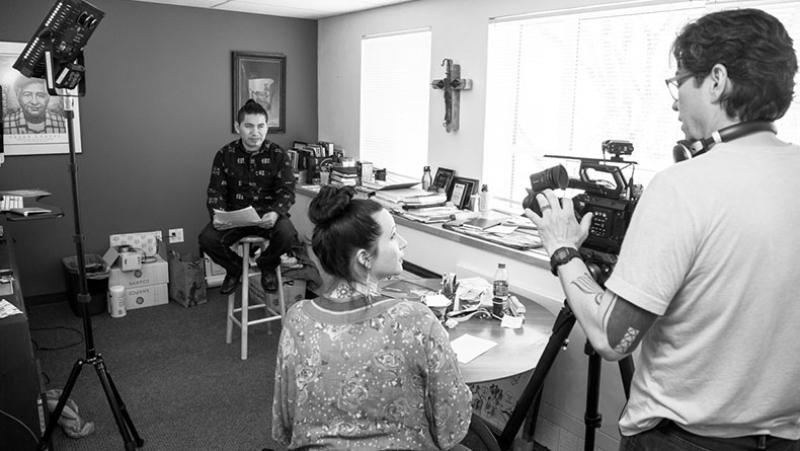Healing Historical Trauma
Community-based archive focuses on Indigenous knowledge to reduce health impacts of historical trauma

Ramona Beltrán interviews participant Bonifacio Sanchez Flores, MSW ’17, while Steven Yazzie videotapes the session. Photo by Mark Woolcott.
How do we decolonize a Western history that has centered White voices and marginalized, or completely erased, Indigenous perspectives? University of Denver Graduate School of Social Work Associate Professor Ramona Beltrán and Professor Debora Ortega are tackling that challenge with the aim of reducing the health impacts of historical and intergenerational trauma in Indigenous and Latinx communities.
Through the Our Stories, Our Medicine Archive (OSOMA) project, Beltrán is creating a community-based participatory archive that centers traditional Indigenous knowledge. The research team — Beltrán and Ortega; Antonia Alvarez, PhD ’19; doctoral students Lisa Colōn and Xochilt Alamillo; and IRISE Post-Doctoral Fellow David Barillas-Chon — is conducting in-depth oral history interviews with Indigenous and Latinx adults, facilitating dialogue about cultural perceptions of health and healing, and creating an interactive digital archive where Indigenous and Latinx people can learn about culture, genealogy and traditional health knowledge and see themselves reflected in others
“Indigenous and Latinx folks struggle with broad health disparities,” Beltrán says, noting that Western health approaches focus on individual behavior and pathology rather than systems and strengths. “There is empirical research pointing to culture as an important part of reducing trauma and improving health outcomes. Focusing on culture helps us to use our own words and approaches to address health risks.”
For instance, rather than talking about diet, the conversation may be about food as medicine — how some traditional foods such as nopales, for example, have a positive effect on regulating blood sugar. “Using a culture-centered approach to health knowledge and practice in a way that isn’t colonizing or shaming can shift behaviors,” Beltrán says.
Beltrán and team used a culture-centered approach to the research design as well. Everyone participating in the project is Indigenous, mixed race and/or queer identifying, she notes, and the design was developed in story circle meetings. “We each took turns telling stories so we could work out how we would ask the questions in interviews,” says Beltrán. The questionnaire is story based and developed from the Mexica (pronounced meh-shee-cah) Medicine Wheel framework for understanding health and wellness. In addition, project implementation has been inspired by the Four Seasons methodology approach. Considering natural cycles, winter, for instance, is a time for inward focus and design and development, and spring is a time to begin recruitment and interviews.
Also notable is that community members are the gatekeepers of their own knowledge, Beltrán says, with individual participants deciding what gets shared and in what way, how and with whom. “The idea is that we get to be in control of our own narrative when it comes to identity, genealogy, health and culture.”
Funded by a University of Denver PROF grant and a recently awarded grant from the University of Denver Interdisciplinary Research Institute for the Study of (In)Equality (IRISE), the project is a partnership between the Graduate School of Social Work, the University of Denver Library (the library’s Katherine Crowe, Denisse Solis and Jack Maness are providing expertise on archiving), University of Denver Latino Center for Community Engagement and Scholarship, and the Latino Community Foundation of Colorado. It bridges the art/science divide, Beltrán says, noting that multidisciplinary artist Steven Yazzie is contributing videography for the project, and Mark Woolcott is the project’s photographer. “Having professional artists be a part of our team while we’re thinking about the project implementation and research design has led to this generative process about how to approach the research more holistically,” Beltrán says. The interviews might even morph into creative opportunities, such as a documentary that brings attention to traditional health knowledge.
The research team has completed its first wave of 12 interviews and solidified its approach to capturing and digitally archiving content—from videotaped oral histories to still images of people and objects. In the coming year, they’ll convene a community advisory board, launch the online archive and conduct another 20 interviews. Working with medical professionals, the team also will conduct a systematic content analysis of interviews and archival content to identify opportunities to develop culture and community-centered health promotion tools. “We want to make sure that the cultural health knowledge we’re providing is also in conversation with evidence-based treatment approaches,” Beltrán says.
So far, Beltrán says, “We’ve learned that people’s stories vastly transcend the stereotypes and the narratives forwarded by Western knowledge. We’re dynamic and evolving and curious and creative, and we’re defining what being Indigenous is to us and not being defined by outsiders.”
The intent, she says, is healing.




